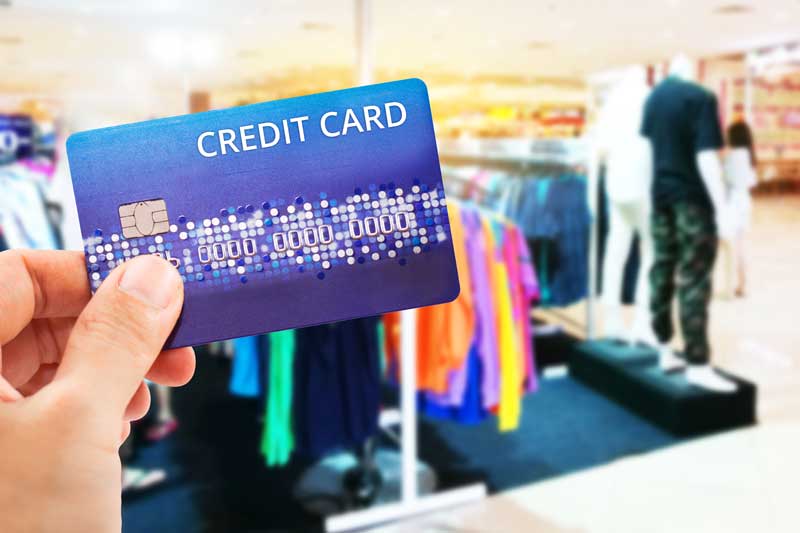Store Credit Cards Not Consumer’s Best Friend
Everyone knows the pitch. You’ve spent half an hour trying on clothes off the rack at a shopping mall department store, found three shirts that look perfect and take the items to the checkout counter. The clerk rings them up, then springs the question:
“Have you considered applying for our credit card?” the clerk asks. “Apply now and you’ll get 15% off today’s purchase.”
Who wouldn’t like to save 15%? Besides, what’s wrong with another card?
Turns out, there are lots of good reasons to say no thanks.
Taking on a new card, especially one you hadn’t thought about acquiring until a moment before, might not be the wisest move. Unlike old-fashioned department store charge cards, most branded store cards are actual credit cards, replete with Visa and MasterCard logos. Unlike the charge cards of yore which required customers to pay balances in full, today’s charge cards accept small minimum monthly payments with very high interest rates on unpaid balances.
Stores Make Big Profits on Cards
For department stores, which are struggling mightily with competition from on-line retailers, credit cards have become an important source for profits. The New York Times recently reported that branded credit cards accounted for 39% of Macy’s $1.9 billion in profit in 2016, up from 26% three years earlier.
Other merchants have also enjoyed growth in branded-card profits, giving them an incentive to aggressively push cards to ever more customers.
Many consumers routinely struggle with credit, and for those who have a hard time managing credit, a wallet full of store cards is disaster in motion.
Each new card allows customers to borrow more, and before long they are swamped with more debt than they can repay. Worse still, branded store cards often carry interest rates that are considerably higher than the Visa and MasterCards that banks issue. In some cases, stores charge as much as 30% interest on their cards, more than 10 percentage points higher than typical bank card interest.
Store Card May Help Credit Score
In some instances, store credit cards can be helpful. For those who lack a credit history or are in the process of rebuilding one, store cards can be easier to obtain than their bank-issued counterparts and using them can help boost your credit score.
But store cards have lower credit limits than bank-issued, a disadvantage for another metric used to compute credit scores, credit utilization, which is the percentage of your credit limit you spend. Lenders like to see credit utilization limited to 30% or less of the spending limit on your card.
The three large companies that assign consumer credit scores add up your credit balances and divide your credit limits. Running a $1,000 balance is more negative for your credit score if it’s on a store-issued card with a $1,200 limit because it represents an 83.3% credit utilization (1,000 divided by 1,200 = 83.3). If you had a bank-issued card with a $10,000 credit lime and ran up a $1,000 balance, your credit utilization would only be 10% (1,000 divided by 10,000 = 10%.
Store cards also might encourage you to buy more from the issuing merchant. Target, for instance, offers 5% off each purchase made with one of its store cards. Other merchants offer special discounts during sales. In addition, store sales associates often receive incentive pay for each account they open. It’s the reason why checkout person tries so hard to coax you to sign up for a store card.
Weight Benefits of Store Card Before Signing up
In an improving economy, store credit offers merchants a strong source of supplemental income. But in a recession, those advantages could vanish as customers find it difficult or impossible to stay current on their credit card debts. For consumers, high interest on unpaid balances could lead to insolvency.
As a rule, think twice before you take on a new store card. Consider the terms before applying, and don’t let a one-time 15% discount on purchases be the deciding factor. Think about whether the card will help up, or just add another bill to the monthly mix. If you are trying to build credit, using a store card wisely could be an asset, but for someone already struggling with too many monthly payments, it could mean trouble.
Here some suggestions:
- If you apply for a store card as a means of improving your credit score, use the card responsibly and pay the balance in full every month. When your credit score improves, you’ll be able to qualify for bank-issued cards with more favorable terms – some that might include perks like cash-back on purchases or frequent flyer miles.
- Only use the card for purchases you would normally make. Don’t use a store card to get a discount on an impulse buy. If the card is an enticement to break you budget, it will do you more harm than good.

4 MINUTE READ
Home » InCharge Blog »
Sources:
- Corkery, M. and Silver-Greenberg, J. (2017, May 11) Profits from Store-Branded Credit Cards Hide Depth of Retailers’ Troubles. Retrieved from: https://www.nytimes.com/2017/05/11/business/dealbook/retailer-credit-cards-macys-losses.html
- Hardeman, B. (2014, February 6) 4 Smart Ways to Use Retail Store Credit Cards. Retrieved from: http://money.usnews.com/money/blogs/my-money/2014/02/06/4-smart-ways-to-use-retail-store-credit-cards

















